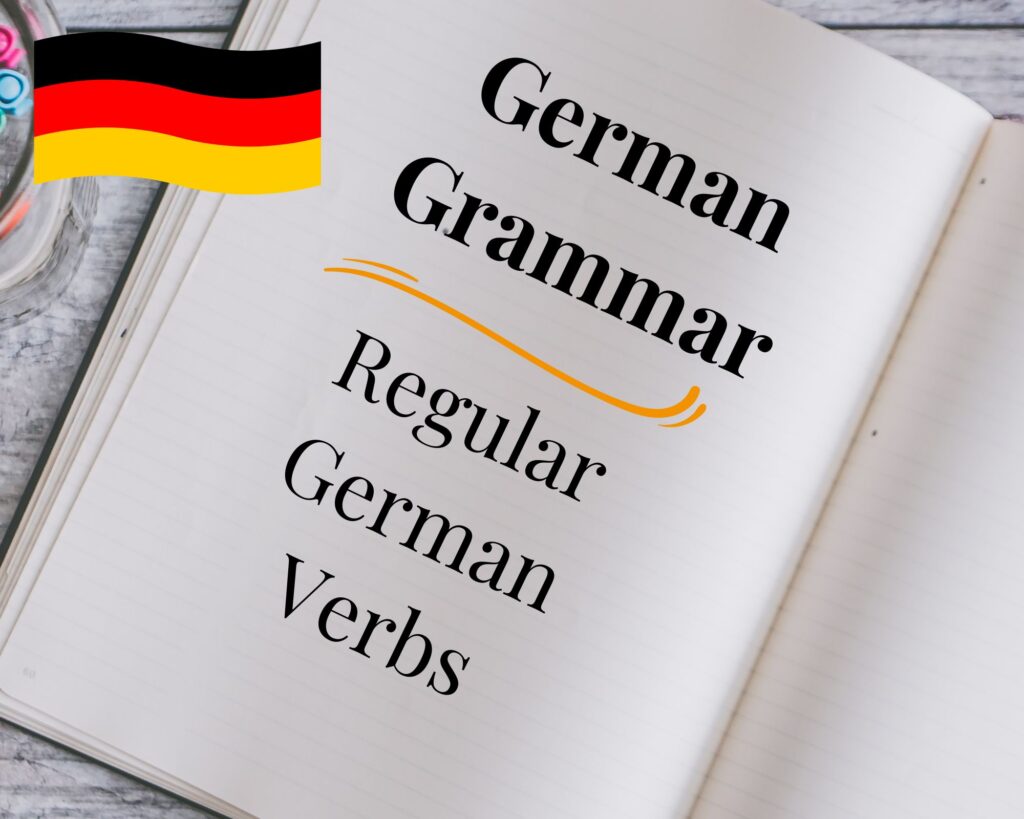
36 Regular German Verbs and How to Use Them
In the German language, there are many verbs, but they can be divided into two groups: regular verbs and irregular verbs. Regular or weak verbs follow a simple pattern in the present tense, making them an excellent starting point for beginners.
Learning how to conjugate German verbs is an essential step in mastering the German language. In this article, you’ll learn the step-by-step process of conjugating regular German verbs and see examples to make it easier to understand.
By the end of this article, you will be able to conjugate regular verbs with ease and confidence. So, let’s get started!
How to Conjugate Regular German Verbs in the Present Tense
To conjugate regular verbs in the present tense, all you need to do is keep the main stem and add a simple ending based on the personal pronoun.
Weak or regular verbs keep the main stem and apply a simple ending:
- Ich – e
- Du – (e)st
- Er/sie/es/ihr – (e)t
- Wir/Sie/sie – en
Although irregular verbs may pose more of a challenge, mastering regular verbs is a solid foundation for becoming proficient in the German language.
How to Conjugate Regular German Verbs in the Past Tense
In addition to the present tense, learning how to conjugate regular German verbs in the past tense is also crucial in mastering the language. Regular verbs in the past tense follow a predictable pattern, making them easier to learn.
- Ich – te
- Du – t(e)st
- Er/sie/es/ihr – (e)te
- Wir/Sie/sie – ten
As you can see, conjugating regular German verbs in the past tense is a straightforward process. Once you understand the pattern and rules for conjugating regular verbs in the past tense, you will be able to use them to communicate past actions with ease.
36 Examples of Regular German Verbs Conjugated
Now that you understand how to conjugate regular German verbs, it’s time to put this knowledge into practice with some examples. Let’s look at how to conjugate regular verbs using personal pronouns and the appropriate endings.
1 antworten (to answer)
Ich antworte, du antwortest, er/sie/es/ihr antwortet, wir/Sie/sie antworten
- Er antwortet meine Frage. (He is answering my question.)
- Sie antwortet mich. (She answers me.)
2 basteln (to craft)
Ich bastle, du bastelst, er/sie/es/ihr bastelt, wir/Sie/sie basteln
- Sie bastelt in ihrer Freizeit. (She does crafts in her free time.)
- Wir basteln eine Geburtstagskarte. (We are crafting a birthday card.)
3 besuchen (to visit)
Ich besuche, du besuchst, er/sie/es/ihr besucht, wir/Sie/sie besuchen
- Wir besuchen meine Großeltern. (We are visiting my grandparents.)
- Sie besucht ihre Freunde. (She visits her friends.)
4 bewegen (to move)
Ich bewege, du bewegst, er/sie/es/ihr bewegt, wir/Sie/sie bewegen
- Ich bewege mich. (I am moving.)
- Du bewegst dich gerne zu Musik. (You like to move to music.)
5 bestellen (to order)
Ich bestelle, du bestellst, er/sie/es/ihr bestellt, wir/Sie/sie bestellen
- Ich bestelle Pizza. (I am ordering pizza.)
- Du hast Essen bestellt. (You ordered food.)
6 bringen (to bring)
Ich bringe, du bringst, er/sie/es/ihr bringt, wir/Sie/sie bringen
- Kannst du mir etwas bringen? (Can you bring me something?)
- Er bringt das Buch zurück. (He is bringing the book back.)
7 dauern (to last)
Ich dauere, du dauerst, er/sie/es/ihr dauert, wir/Sie/sie dauern
- Die Fahrt dauert zwei Stunden. (The trip lasts two hours.)
- Der Film dauerte drei Stunden. (The movie lasted three hours.)
8 diskutieren (to discuss)
Ich diskutiere, du diskutierst, er/sie/es/ihr diskutiert, wir/Sie/sie diskutieren
- Wir diskutieren Politik. (We are discussing politics.)
- Sie diskutieren eine neue Idee. (They are discussing a new idea.)
9 duschen (to shower)
Ich dusche, du duschst, er/sie/es/ihr duscht, wir/Sie/sie duschen
- Ich dusche jeden Morgen. (I shower every morning.)
- Sie duscht nach dem Sport. (She showers after exercise.)
10 enden (to end)
Ich ende, du endest, er/sie/es/ihr endet, wir/Sie/sie enden
- Das Konzert endet um 22 Uhr. (The concert ends at 10 pm.)
- Der Film endete überraschend. (The movie ended surprisingly.)
11 entdecken (to discover)
Ich entdecke, du entdeckst, er/sie/es/ihr entdeckt, wir/Sie/sie entdecken
- Ich entdeckte eine neue Stadt. (I discovered a new city.)
- Sie entdecken ein neues Restaurant. (They discover a new restaurant.)
12 erzählen (to tell)
Ich erzähle, du erzählst, er/sie/es/ihr erzählt, wir/Sie/sie erzählen
- Er erzählt eine Geschichte. (He is telling a story.)
- Sie erzählte mir von ihrem Urlaub. (She told me about her vacation.)
13 feiern (to celebrate)
Ich feiere, du feierst, er/sie/es/ihr feiert, wir/Sie/sie feiern
- Wir feiern heute Abend. (We are celebrating tonight.)
- Sie feiert ihr Geburtstag. (She is celebrating her birthday.)
14 fliegen (to fly)
Ich fliege, du fliegst, er/sie/es/ihr fliegt, wir/Sie/sie fliegen
- Ich fliege in den Urlaub. (I am flying on vacation.)
- Sie fliegt nach New York. (She is flying to New York.)
15 reisen (to travel)
Ich reise, du reist, er/sie/es/ihr reist, wir/Sie/sie reisen
- Wir reisen gerne. (We like traveling.)
- Du bist nach Spanien gereist. (You traveled to Spain.)
16 malen (to paint or draw)
Ich male, du malst, er/sie/es/ihr malt, wir/Sie/sie malen
- Du malst gerne Landschaften. (You like to paint landscapes.)
- Ihr malt gerne. (You (plural) like to paint.
17 tanzen (to dance)
Ich tanze, du tanzt, er/sie/es/ihr tanzt, wir/Sie/sie tanzen
- Ich tanze gerne in der Diskothek mit meinen Freunden. (I like to dance in the club with my friends.)
- Wir tanzen zusammen. (We dance together)
18 singen (to sing)
Ich singe, du singst, er/sie/es/ihr singt, wir/Sie/sie singen
- Er singt in einem Chor. (He sings in a choir.)
- Wer singt jetzt? (Who is singing now?)
19 schwimmen (to swim)
Ich swimme, du swimmst, er/sie/es/ihr swimmt, wir/Sie/sie swimmen
- Im Sommer schwimme ich oft. (In the summer, I often swim.)
- Sie schwimmt jeden Tag. (She swims every day.)
20 fotografieren (to take photos)
Ich fotografiere, du fotografierst, er/sie/es/ihr fotografiert, wir/Sie/sie fotografieren
- Ich fotografiere die Natur. (I take photos of nature.)
- Was fotografiert er? (What is he taking photos of?)
21 bezahlen (to pay)
Ich bezahle, du bezahlst, er/sie/es/ihr bezahlt, wir/Sie/sie bezahlen
- Darf ich bezahlen? (May I pay?)
- Bazahlst du? (Are you paying?)
22 bekommen (to get)
Ich bekomme, du bekommst, er/sie/es/ihr bekommt, wir/Sie/sie bekommen
- Ich habe zehn Euro bekommen. (I got ten Euros.)
- Du bekommst nichts. (You get nothing.)
23 kennen (to know)
Ich kenne, du kennst, er/sie/es/ihr kennt, wir/Sie/sie kennen
- Kennst du Thomas? (Do you know Thomas?)
- Seit wann kennt ihr euch? (How long have you know each other?)
24 machen (to do)
Ich mache, du machst, er/sie/es/ihr macht, wir/Sie/sie machen
- Was machst du? (What are you doing?)
- Wir machen Hausaufgaben. (We’re doing homework.)
25 Sparen (to save)
Ich spare, du sparst, er/sie/es/ihr spart, wir/Sie/sie sparen
- Wie viel Geld sparen wir? (How much money do we save?)
- Du sparst dein Geld. (You save your money.)
26 Stehen (to stand)
Ich stehe, du stehst, er/sie/es/ihr steht, wir/Sie/sie stehen
- Ich stehe hinter dir. (I’m standing behind you.)
- Du stehst da. (You stand there.)
27 Studieren (to study)
Ich studiere, du studierst, er/sie/es/ihr studiert, wir/Sie/sie studieren
- Was studierst du? (What are you studying?)
- Ich studiere Chemie. (I’m studying chemistry.)
28 Verdienen (to earn)
Ich verdiene, du verdienst, er/sie/es/ihr verdient, wir/Sie/sie verdienen
- Er verdient viel Geld. (He earns a lot of money.)
- Ihr verdient wenig Geld. (You (plural) earn little money.)
29 warten (to wait)
Ich warte, du wartest, er/sie/es/ihr wartet, wir/Sie/sie warten
- Wie lange wartest du? (How long are you waiting?)
- Sie wartet lange. (She waits a long time.)
30 Wandern (to hike)
Ich wandere, du wanderst, er/sie/es/ihr wandert, wir/Sie/sie wandern
- Er wandert in den Bergen. (He hikes in the mountains.)
- Du wanderst allein. (You hike alone.)
31 hören (to hear)
Ich höre, du hörst, er/sie/es/ihr hört, wir/Sie/sie hören
- Ich höre etwas. (I hear something.)
- Wir hören Geräusche. (We hear sounds.)
32 Wechseln (to change)
Ich wechsle, du wechselst, er/sie/es/ihr wechselt, wir/Sie/sie wechseln
- Wo kann ich Geld wechseln? (Where can I change money?)
- Er wechselt das Öl. (He’s changing the oil.)
33 Schneiden (to cut)
Ich schneide, du schneidest, er/sie/es/ihr schneidet, wir/Sie/sie schneiden
- Sie schneidet das Papier. (She cuts the paper.)
- Schneidest du dir die Haare? (Are you cutting your hair? Do you cut your hair?)
34 Kleben (to stick)
Ich klebe, du klebst, er/sie/es/ihr klebt, wir/Sie/sie ekleben
- Es klebt an mir. (It’s sticking to me.)
- Es klebt zusammen. (It’s sticking together.)
35 schließen (to close)
Ich schließe, du schließt, er/sie/es/ihr schließt, wir/Sie/sie schließen
- Sie schließt die Tür. (She closes the door.)
- Wir schließen um 20 Uhr. (We close at 8 pm)
36 Öffnen (to open)
Ich ȍffne, du ȍffnest, er/sie/es/ihr ȍffnet, wir/Sie/sie ȍffnen
- Der Laden ȍffnet um 8 Uhr. (The store opens at 8 am.)
- Öffnest du die Tür, bitte? (Open the door please.)
Final Thoughts on Regular German Verbs
To sum it up, regular German verbs are like building blocks for learning the language. They’re predictable, easy to learn, and provide a solid foundation for more complex grammar structures.
By mastering the conjugation of regular verbs in both the present and past tenses, you’ll be able to express yourself more confidently in German. Don’t forget that learning a language takes time, patience, and practice. So, keep at it, and before you know it, you’ll be using German verbs with ease like a native speaker!
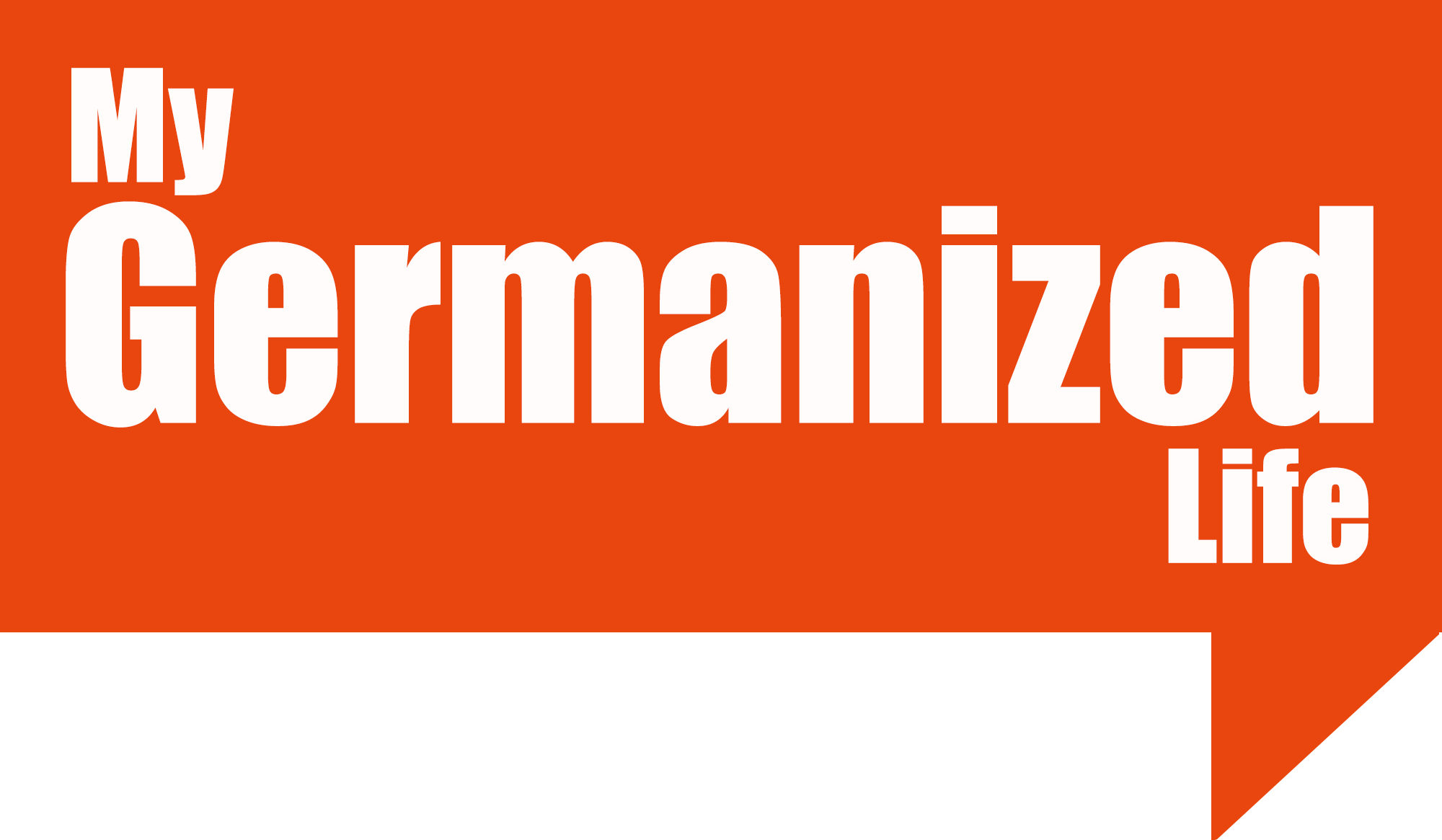
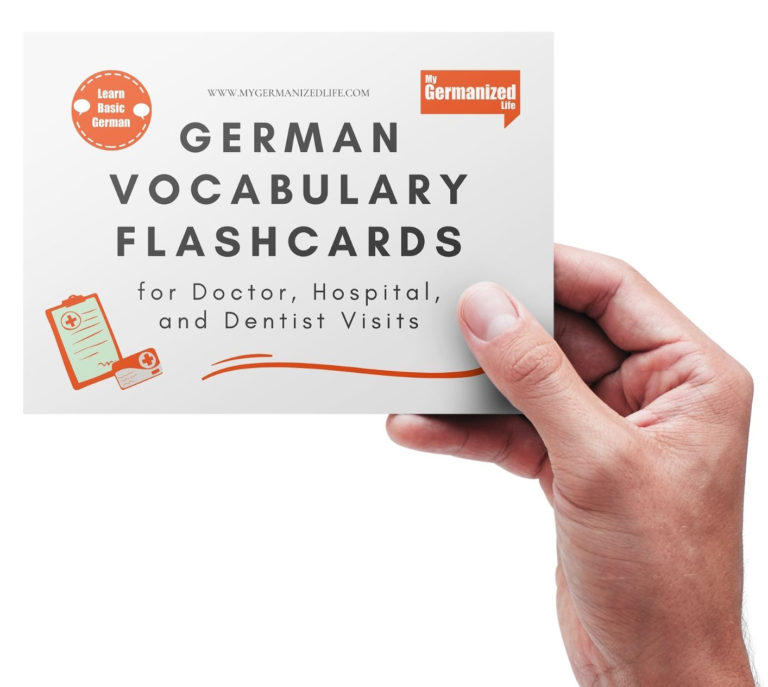
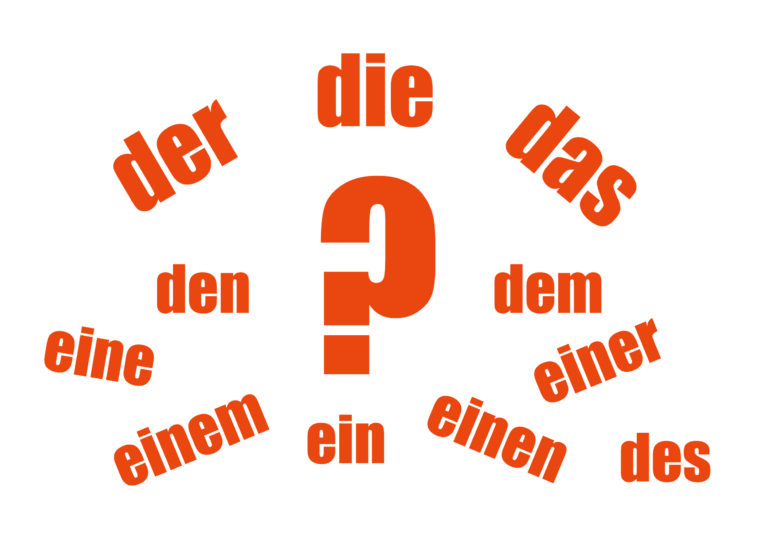
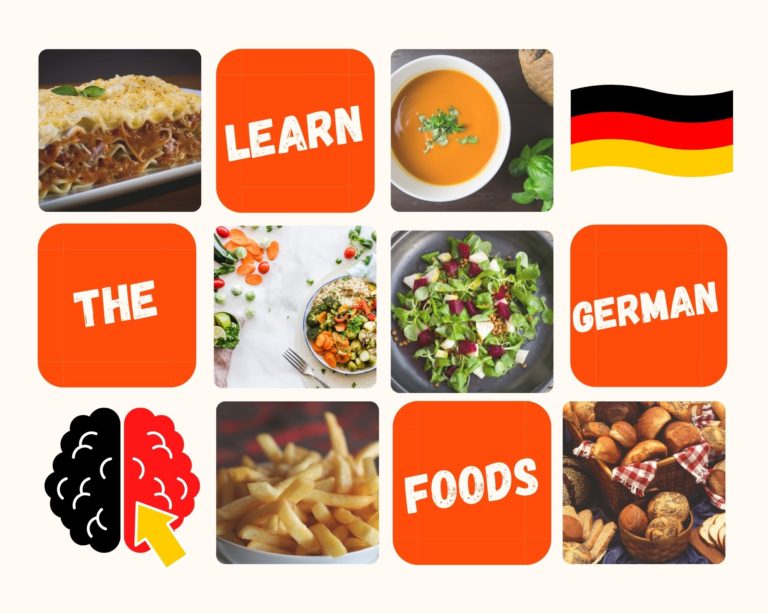


You should take part in a contest for one of the best blogs on the web. I will recommend this site!